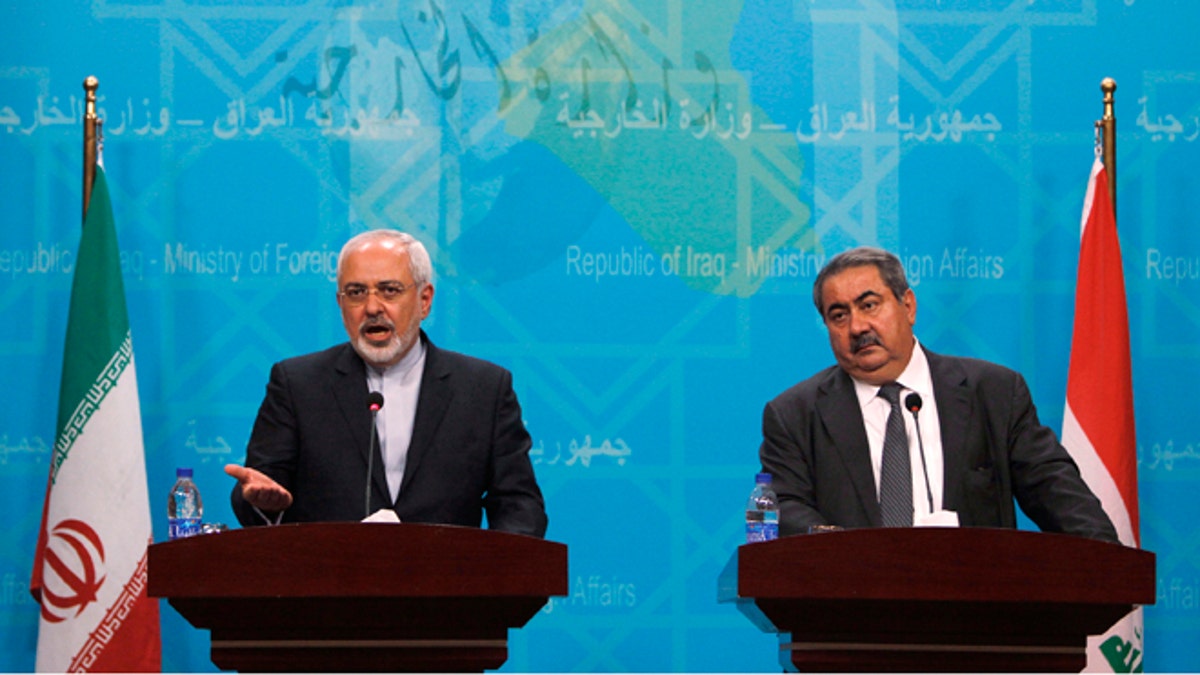
Iranian Foreign Minister Mohammad Javad Zarif, left, standing next to his Iraqi counterpart Hoshyar Zebari, speaks during a press conference in Baghdad, Iraq, Sunday, Aug. 24, 2014. (AP)
U.S. officials are taking a wary view of the disclosure this week that Iran – one of four countries the United States accuses of supporting terrorism – has begun arming the Kurdish Regional Government in northern Iraq, as the Kurds scramble to combat the threat posed by ISIS.
ISIS, also known as the Islamic State, has seized large swaths of territory in Syria and Iraq, and recently came close to overrunning Erbil, the capital of the KRG in the semi-autonomous Kurdish region. It was the immediate threat to Erbil, where the U.S. has a number of diplomats stationed, that prompted President Obama to launch airstrikes against ISIS.
While the Kurds are grateful for American intervention, they also say the central Iraqi government in Baghdad has starved them of cash and military hardware in this time of grave threat. “We asked for weapons and Iran was the first country to provide us with weapons and ammunition," KRG President Massoud Barzani said during an appearance in Erbil on Tuesday with Iran’s foreign minister.
The State Department said it could not confirm the weapons deliveries but indicated that Washington regards the development with apprehension. “I think we've expressed concerns in the past about the reports of Iranian flow of arms into Iraq,” spokesperson Jen Psaki told reporters on Tuesday. “That would apply here as well.”
Neither the Iranians nor the Kurds specified whether Tehran’s military assistance is going directly to the KRG or being routed through the central Iraqi government. However, analysts said it was unlikely the Iranians would seek out a middle-man for the transfers, and emphasized that the expanded role for Tehran in the conflict in Iraq would not necessarily augur the KRG becoming, in effect, a client of the Islamic regime.
“The dynamics of politics in Kurdistan does not lend itself to too much Iranian domination, unlike what you might see in Baghdad, where Iran is overwhelming the decision-making process,” said Dr. Dlawer Ala'Aldeen, a former Kurdish Cabinet officer who is now president of an Erbil-based think tank called the Middle East Research Institute.
“Remember, ISIS is actually fully equipped by American, or the latest, technology that they seized from the Iraqis and they have got the funding they need,” Ala’Aldeen told Fox News in an interview. “If you are in the place of the Kurds, what would you do when you’re facing that? You would ask for help from any neighbor.”
When ISIS captured the Iraqi city of Mosul in early June, the Kurds’ formidable fighting force, known as the Peshmerga, responded by seizing control of the oil hub of Kirkuk. That led to speculation that the KRG might seek to exploit the instability in Iraq to pursue the Kurds’ longstanding dream of completely autonomous statehood.
U.S. officials have sought to tamp down such expectations, telling the Kurds privately that while they will likely retain control of Kirkuk, their quest for statehood is best deferred a while longer, while Washington and its European allies make a last push for the creation of a truly inclusive government in Baghdad.
Longtime observers of the Iranian regime also pointed out that it has used brutal means to suppress Iran’s own population of 8 million Kurds, whose yearning for independence matches that of their Iraqi brethren. By steering arms to the Iraqi Kurds, a former National Security Council official said, the Iranians may be trying simultaneously to weaken the military position of ISIS and use influence with the Kurds to slow their bid for complete autonomy – lest the Iranian Kurds be emboldened by it.
“Iran has fought some really grisly battles with its own Kurdish population over the years,” said Kenneth Pollack, a senior fellow at the Brookings Institution. “And especially in the last two or three decades, one of the ways that [the Iranians] have tried to kind of mute that desire for independence on the part of their own Kurds has been keeping their hooks in the Iraqi Kurds, trying to prevent them from declaring independence.”




